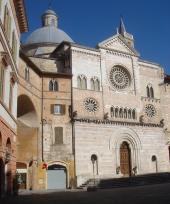I admit I took on the editing of Elizabeth Ruth Obbard’s forthcoming book READING THE BOOK OF LIFE (New City Press) partly from curiosity because I share a name with the subject.
I was named after Angela Merici, a pioneer of the education of women but the subject of this biographical sketch and selection of documents is another Italian Angela, from Foligno, halfway between Assisi and Spoleto.Her husband, sons and mother died within a short time, probably of the plague. Brutally shorn of these intimate ties she re-invented herself with determination and courage.
She could neither read nor write so it’s from dictated accounts that we gather what a striking trust she had in her own experience. She felt and perceived acutely. Her inner eye was sharp. We hear the voice of a woman from the thirteenth century, robust and passionate, constantly open to fresh perspectives.
I have a fondness for personal writings from the twelfth and thirteenth centuries, particularly the letters of Jordan of Saxony which typify the immediacy of someone expressing the inner life in the context of the multifarious tasks and surprises of the daily round. Jordan writes of his visit to “the new university at Oxford” in 1230. He’d walked there across Europe.
So much that, to us, is ancient was, to people of these centuries, innovative and untried. They are far from us and yet, in many important ways, close, particularly when writing about their emotions. And they knew how to love – boldly. Philip Larkin was right about what survives of us.
